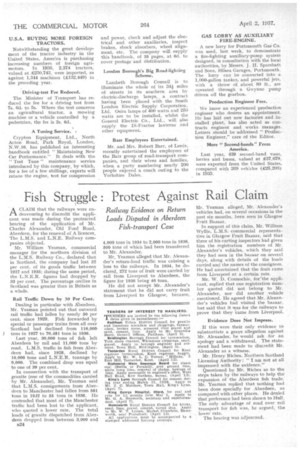Fish Struggle : Protest Against Rail Claim
Page 38

If you've noticed an error in this article please click here to report it so we can fix it.
Railway Evidence on Return Loads Disputed in Aberdeen Fish-transport Case
A CLAIM that the railways were en
deavouring to discredit the applicant was made during the protracted hearing of the application of Mr. Charles Alexander, Old Ford Road, Aberdeen. for the renewal of A licences. The L.M.S. and L.N.E. Railway companies objected.
Mr. William Yeaman, commercial manager for the northern division of the L.M.S. Railway Co., declared that in Scotland, the company had lost 32 per cent. of its goods traffic between 1927 and 1935; during the same period, the L.N.E.R. figures had dropped by 33 per cent. The percentage aecline in Scotland was greater than in Britain as a whole.
Rail Traffic Down by 50 Per Cent.
Dealing in particular with gberdeen, Mr. Yeaman pointed out that outward rail traffic had fallen by nearly 50 per cent. since 1929. Fish forwarded by special or passenger trains from all over Scotland had declined from 116,000 1 tons in 1927 to 70,481 tons in 1936.
Last year, 30,000 tons of fish left Aberdeen by rail and 11,000 tons by road. L.M.S. traffic in fish from Aberdeen had, since 1928, declined by 10,000 tons and L.N.E.R. tonnage by 9,000. The combined drop was equal to one of 39 per cent.
In connection with the transport of granite (one of the commodities carried by Mr. Alexander), Mr. Yeaman said that L.M.S. consignments from Aberdeen to Manchester had fallen from 581 tons in 1932 to 55 tons in 1936. He contended that most of the Manchester traffic had been lost to the applicant, who quoted a lower rate, The total loads of granite dispatched from Aberdeen dropped from between 3,000 and B24 4,000 tons in 1934 to 2,000 tons in 1936, 500 tons of which had been transferred to Mr. Alexander.
Mr. Yeaman alleged that Mr. Alexander's return-load traffic was causing a loss to the railways. In 1934, he declared, 272 tons of fruit were carried by rail from Liverpool to Aberdeen, the figure for 1936 being 40 tons.
Ile did not accept Mr. Alexander's statement that he did not carry fruit from Liverpool to Glasgow, because, Mr. Yeaman alleged, Mr. Alexander's vehicles had, on several occasions in the past six months, been seen in Glasgow Fruit Bazaar.
In support of this claim, Mr. William Wyllie, L.M.S. Commercial representative in Glasgow Fruit Bazaar, said that three of his carting inspectors had given him the registration numbers of Mr. Alexander's vehicles, which they said they had seen in the bazaar on several days, along with details of the loads carried and the names of the consignees. He had ascertained that the fruit came from Liverpool at a certain rate.
Mr. W. D. Connochie, for"the applicant, replied that one registration number quoted did not belong to Mr. Alexander, nor did another vehicle mentione,d. He agreed that Mr. Alexander's vehicles had visited the bazaar, but said that it w.as for the railways to prove that they bame from Liverpool.
Evidence Does Not Impress.
If this were their only evidence to substantiate a grave allegation against Mr. Alexander, he would ask for an apology and a withdrawal. The statement had been made to discredit Mr. Alexander as a witness.
Mr. Henry Riches, Northern Scotland Licensing Authority : "I am not at all impressed with the evidence."
Questioned by Mr. Riches as to the steps taken by the railways to help the expansion of the Aberdeen fish trade; Mr. Yeaman replied that nothing had been done specially for Aberdeen, as compared with other places. He denied that preference had been shown to Hull. The only advantage of road over rail transport for fish was, he argued, the lower rate.
The hearing was adjourned.




























































































